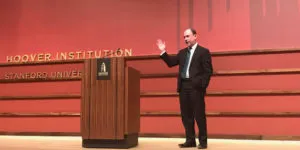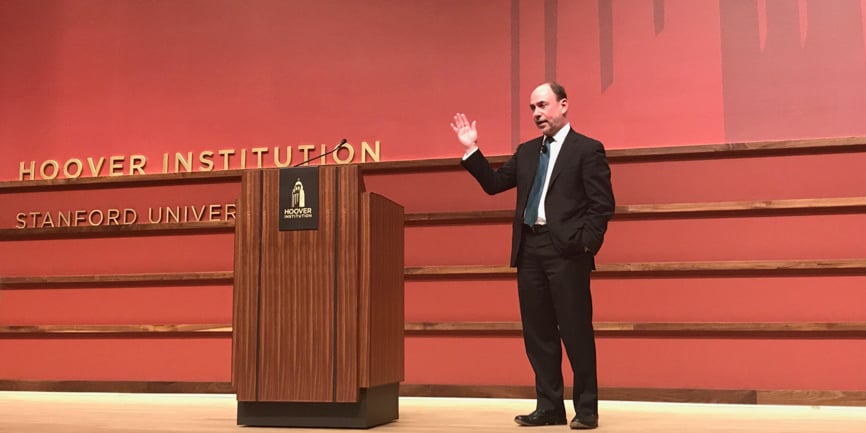Former Congressional Budget Office (CBO) Director Douglas Holtz-Eakin evaluated the Trump administration on its handling of economic issues in a lecture titled “The Trump Policy Agenda: Preliminary Grade and Future Outlook” at the Hoover Institution Thursday.

Holtz-Eakin, who served as CBO Director from 2003-2005 and was chief economic advisor on John McCain’s 2008 presidential campaign, is now president of the American Action Forum think tank.
During his lecture, Holtz-Eakin graded the Trump administration on issues including the Affordable Care Act (ACA), regulatory reform, tax reform, trade and immigration policy and infrastructure.
“Today’s goal is to take the emotion out — try to take a look at the economics and politics without worrying about the day-to-day chatter of the personalities that are involved,” Holtz-Eakin said.
Holtz-Eakin opened with an account of census data on income in 2016. He noted that, although the median real household income rose 3.2 percent, the median real household income where people worked full-time rose zero percent. Holtz-Eakin indicated it is the “mandate” of the Trump administration to produce better economic growth in terms of real wages.
“I believe Donald Trump is President, and Republicans control the House and the Senate for one and only one reason,” Holtz-Eakin said. “And that is because the American public wanted better economic performance — better macroeconomic performance in particular.”
Holtz-Eakin began the grading by giving the Trump administration an F on its attempts to repeal and replace the ACA.
“There was no way ever that [Republicans] could repeal every piece of the Affordable Care Act using these special procedures known as reconciliation that allows them to just have Republican votes in the Senate and get it done,” Holtz-Eakin said. “The rules preclude touching large chunks of the Affordable Care Act, so they set out on a mission that they literally politically could not succeed.”
Holtz-Eakin added that he does not think Republicans will try to repeal the ACA again in 2018.
“There was nobody in the end who was supportive of these efforts,” Holtz-Eakin said.
In terms of Republican tax reform efforts, Holtz-Eakin gave the Trump Administration a B, emphasizing his amazement that Republicans were able to pass a bill so quickly. He recalled how the 1986 tax reform took years to pass after it started circulating in the mid-1970s and pointed out that former President George H. W. Bush could not pass his tax reform plan until June 2001 despite outlining the plan in 1999, before he even took office.
“You can lose a lot of money betting on the Senate to get something done, and they got this through, and they got it through fast,” Holtz-Eakin said.
However, Holtz-Eakin did not see the bill as a complete success, especially given how little the public knew about it. He said he views the bill as a combination of valuable corporate reforms and what he referred to as “junk” on the individual side, which he doubts will change economic performance.
Holtz-Eakin did not shy away from critique of the Trump administration’s international economic policy. He gave the administration a C but said he could come back with “a much lower grade next year.”
“I think that charitably, [the Trump administration] is a thousand percent wrong on everything that they have in mind here,” Holtz-Eakin said.
Holtz-Eakin described withdrawing from the Trans-Pacific Trade Partnership as an “extraordinary step in the wrong direction.” He said Trump’s plan to renegotiate the North American Free Trade Agreement (NAFTA) worries him because NAFTA not only fosters strong relations between the United States and Mexico, but also solidifies the North American energy market and American manufacturers’ supply chains.
Holtz-Eakin then expressed confusion over Trump’s proposed renegotiation of the United States-Korea Free Trade Agreement, which he sees as mystifying at a time when North Korea may present the biggest geopolitical threat in the world.
Next, Holtz-Eakin discussed immigration policy in regards to the American economy.
“Everyone agrees the existing system is broken and should be changed legislatively,” Holtz-Eakin said. “There is nothing about travel bans, suspending DACA [Deferred Action for Childhood Arrivals] and a whole variety of other things that matches that policy challenge.”
Although Holtz-Eakin did not give a grade for the Trump administration’s approach to infrastructure, saying it was “incomplete,” he did give some insight into the future of American economic policy in general. Holtz-Eakin said the change in average Americans’ real wages will be the litmus test for the Trump administration’s success.
Holtz-Eakin’s most positive reception for the Trump administration came with regards to its repeal and reform of government regulations.
“In the eight years of the Obama administration, the administration finalized a costly regulation at an average rate of 1.1 per day,” Holtz-Eakin said. “The cumulative, self-reported cost to comply with those new regulations was $890 billion dollars.”
He described Trump’s “one in, two out” executive order as a significant initiative in support of reduced regulation. The order mandates that “unless prohibited by law, whenever an executive department or agency publicly proposes for notice and comment or otherwise promulgates a new regulation, it shall identify at least two existing regulations to be repealed.”
“The extraordinary thing is that from the moment Donald Trump was inaugurated until the end of fiscal year 2017, that regulatory burden went up zero,” Holtz-Eakin said. “They have shut down the federal regulatory state. I just flatly said it couldn’t be done. They did it.”
Holtz-Eakin emphasized, however, that immediate savings are not the only factor in assessing government regulation. During the question-and-answer session, an audience member raised pollution as an example of a negative externality that could do more damage to the economy with reduced regulation.
“I don’t want to sort of portray this as they’ve gotten rid of every bad regulation, and they haven’t touched any good ones,” Holtz-Eakin said. “I don’t think that’s probably true, but when I talk to people in the business community, they notice, and they are just ecstatic. I think it is one of the reasons why we saw sharp increases in business confidence, particularly the small business confidence, if you look at National Federation of Independent Businesses and the monthly tracking they do.”
After Holtz-Eakin’s lecture, an audience member asked whether the Trump administration’s policies would simply be repealed shortly after Trump leaves office. In response, Holtz-Eakin stressed the importance of bipartisan efforts in crafting effective, long-term policy.
“The Republicans spent the last six years of the Obama administration talking about executive overreach and how you shouldn’t do all of this stuff with executive orders,” Holtz-Eakin said. “And what did they do the moment they took over? Same thing.”
Contact Holden Foreman at hs4man21 ‘at’ stanford.edu.
